
Aug 31
1843 Birth: Count Georg von Hertling: Bavarian politician who served as Prime Minister of Bavaria and as puppet Chancellor of the German Empire from 1917 to 1918. An old man when he became Chancellor, he was unable to overcome the power of the military high command, led by Paul von Hindenburg and Erich Ludendorff, despite having been a deputy to the Reichstag and a leader of the Centre Party. (He was required to resign his seat when he took office under the Kaiser.) In civil life he was a professor of philosophy.
1876 Ottoman Empire: Abdul Hamid II becomes last sultan of the Ottoman Empire to exert absolute power:
Abdul Hamid II . . . (22 September 1842-10 February 1918) was the 34th Sultan of the Ottoman Empire and the last Sultan to exert effective autocratic control over the fracturing state. He oversaw a period of decline in the power and extent of the Empire, including widespread pogroms and government-sanctioned massacres of Armenians, as well as an assassination attempt, ruling from 31 August 1876 until he was deposed shortly after the 1908 Young Turk Revolution, on 27 April 1909. [For further information, click here.]
1880 Birth: Wilhelmina—Queen of the Netherlands:
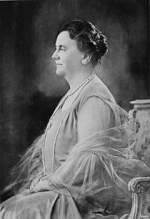
Wilhelmina . . . was Queen of the Kingdom of the Netherlands from 1890 to 1948. She reigned for nearly 58 years, longer than any other Dutch monarch. Her reign saw World War I and World War II, the economic crisis of 1933, and the decline of the Netherlands as a major colonial power. Outside the Netherlands she is primarily remembered for her role in World War II, in which she proved to be a great inspiration to the Dutch resistance. [For further information, click here.]
1897 Birth: Otto Dietrich: the Third Reich's Press Chief, and Hitler's confidante. He was born in August 1887, and died at the age of 65 in 1952, after serving time in Landsberg Prison following the Subsequent Nuremberg Trials, where he was convicted of crimes against humanity and being a member of a criminal organization, namely the SS in the Ministries Trial and sentenced to seven years' imprisonment. After his time as a soldier in World War I, he was awarded the Iron Cross (First Class). After this he went to the universities of Munich, Frankfurt am Main and Freiburg, from which he graduated with a doctorate in political science in 1921. He strongly supported Nazi ideology, and became a member of the NSDAP (Nazi Party) almost immediately after its foundation in 1919. On 1st August 1931 he was appointed Press Chief of the NSDAP, and the following year joined the SS. By 1941 he had risen to the rank of SS-Obergruppenfuehrer. His job as Press Chief overlapped with Goebbels' Ministry for Propaganda, and thus many anecdotes exist of their feuds. They were infamous for their disagreements, and both often felt obliged to "repair" the mistakes of the other. Dietrich retained the confidence of the Fuehrer throughout the regime until Hitler fired him after an argument towards the end of the war. However, in the secrecy mandated by war, Dietrich, who was not in Hitler's "inner circle," often did not truly know of Hitler's whereabouts. In captivity he wrote a book ("The Hitler I Knew") sharply critical of Hitler personally and strongly denouncing the crimes committed in the name of Nazism.
1915 World War I: List Regiment:

Gefreiter Adolf Hitler's 16 Reserve Infantry Regiment continues to occupy a position at Fromelles—pictured above in a drawing by Hitler—on a level field with water channels, willow trees, and willow stalks. In the distance towards the enemy lines lies an insignificant wood with barbed wire entanglements. Under the direction of their defense-minded commander, Lieutenant General Gustav Scanzoni von Lichtenfels, the regiment works ceaselessly day and night to further fortify their position at Fromelles while fighting off repeated assaults by the enemy. [For further details, Click here.]
1916 World War I: List Regiment:
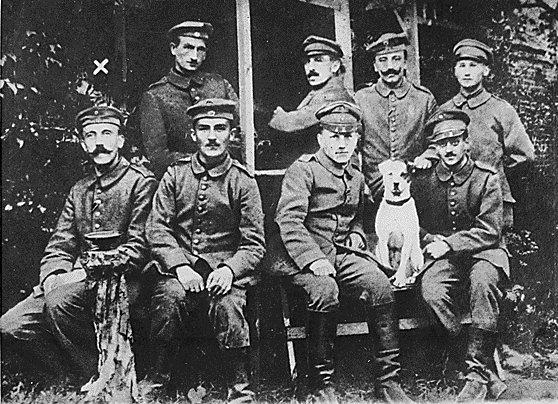
Gefreiter Adolf Hitler endures trench warfare in Flanders (Artois) with 3 Company, 16 Reserve Infantry Regiment [List Regiment]. [For further details, Click here.]
1917 World War I: List Regiment: (July 22-September 8):
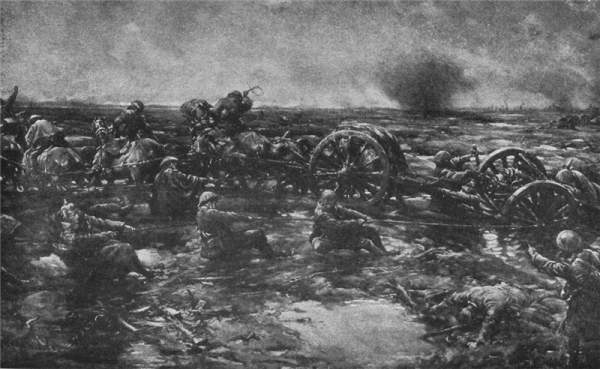
Dispatch Runner Gefreiter Adolf Hitler serves at the front with 3 Company, 16 Bavarian Reserve Infantry Regiment during Phase 2 operations in Flanders. Most of their time in the trenches gas masks are worn, while English bombers attack from the air, and tanks attempt to advance over a long front through seas of mud. [For further details, Click here.]
1918 World War I: List Regiment (August 21-September 27):
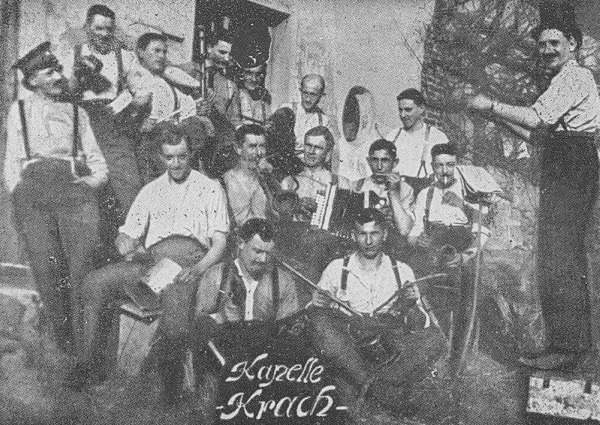
Gefreiter Adolf Hitler attends a signals training course in Nuremberg. [For further details, Click here.]
1919 Various:
The Communist Labor Party is founded in Chicago, with the motto, 'Workers of the world unite!'
For approximately the first half of the 20th century, it was the largest and most widely influential communist party in the country, and played a defining role in the US labor movement from the 1920's through the 1940's. It played a key role in organizing major industrial unions and prominently defended the rights of African-Americans throughout that period, simultaneously surviving the Palmer Raids, the first Red Scare, and many similar attempts at what they saw as suppression by the Government of the United States throughout the first part of its existence.
Pogroms: Petlyura's Ukranian Army kills 35 members of a Jewish defense group:
At that time it is estimated that a third of Europe's Jewry lived within ethnic borders of Ukraine, in what was called the Pale of Settlement. During the Russian Civil War, an estimated 70,000 to 250,000 civilian Jews were killed in the atrocities throughout the former Russian Empire. In Ukraine itself, the estimates of civilian Jews killed range from 35,000 to 50,000 during the period. Some historians suggest that Petlyura as the head of the government did not do enough to stop the pogroms, and in this way encouraged them as a means to strengthen his base of support among his soldiers, commanders and the peasant population at large, appealing to antisemitic sentiments. Petlyura's supporters on the other hand have showed that Petlyura himself was not an anti-Semite, and that he actively sought to stop anti-Jewish violence on numerous occasions, finally introducing capital punishment for the crime of pogroming.
1920 Polish-Bolshevik War: A decisive Polish victory in the Battle of Komarow. It was the biggest cavalry battle in the history of war since 1813 and the last great battle in which cavalry was used as such and not as mounted infantry. The Battle of Komarow was a complete disaster for the Russian 1st Cavalry Army, which sustained heavy casualties and barely avoided being totally surrounded. After the battle, the morale of the 1st Cavalry Army collapsed, and the army which was once the most feared of the Soviet troops was no longer considered an effective fighting force.
1928 Weimar: Berthold Brecht and Kurt Weill's Threepenny Opera premieres in Berlin:
"I think I've written a good piece and that several numbers in it, at least musically, have the best prospects for becoming popular very quickly." This was the assessment offered by the German composer Kurt Weill in a letter to his publisher 10 days before the premiere of his latest work. Created in partnership with the revolutionary dramatist Berthold Brecht, that work would, in fact, prove to be the most significant and successful of Weill’s career and one of the most important works in the history of musical theater: Die Dreigroschenoper (The Threepenny Opera). In addition to running for 400-plus performances in its original German production, Brecht and Weill’s masterpiece would go on to be translated into 18 languages and receive more than 10,000 performances internationally.
1935 Various:
Neutrality Act: Joint Resolution of the Senate and House of Representatives in Congress assembled:
That upon the outbreak or during the progress of war between, or among, two or more foreign states, the President shall proclaim such fact, and it shall thereafter be unlawful to export arms, ammunition, or implements of war from any place in the United States, or possessions of the United States, to any port of such belligerent states, or to any neutral port for transshipment to, or for the use of, a belligerent country.
Italy increases the size of its army to more than one million men.
1939 Various:
Nazi Eugenics: The sixth decree on implementation of the law on sterilization virtually puts an end to sterilizations in Germany. Nazi Germany was not the first or only country to sterilize people considered "abnormal." Before Hitler, the United States led the world in forced sterilizations. Between 1907 and 1939, more than 30,000 people in twenty-nine states were sterilized, many of them unknowingly or against their will, while they were incarcerated in prisons or institutions for the mentally ill. Nearly half the operations were carried out in California. Advocates of sterilization policies in both Germany and the United States were influenced by eugenics. This socio-biological theory took Charles Darwin's principle of natural selection and applied it to society. Eugenicists believed the human race could be improved by controlled breeding.
Countdown to war:
Neville Henderson—the British Ambassador in Germany—instead of informing the Poles of Hitler's proposals and the granting of an extension, tries to dissuades Lipski from meeting with von Ribbentrop at all. Henderson, in his Final Report, writes, "I suggested that he (Lipski) recommend to his government an interview between Marshal Smigly-Rydz and Goering. I felt obliged to add that I could not conceive of the success of any negotiations if they were conducted by Ribbentrop."
A telegram from Sir Howard Kennard—British Ambassador in Warsaw—to Lord Halifax states that Polish Foreign Minister Beck has informed him that Lipski has been forbidden to receive any documents from von Ribbentrop. Lipski telegrams Beck that French Ambassador Coulondre has told him that Henderson has been informed of Germany's intention to wait until midnight August 31st. Lipski writes: "Coulondre advises me to inform the German government, only after midnight, that the Polish Embassy was always at its reach." (Sturdza)
Birger Dahlerus—unofficial peace envoy—continues his shuttle diplomacy. Goering, at Nuremberg:
The British Government was informed what demands Germany would make on Poland. This proposal was not entirely understood, and was then unofficially--but de facto--made known not only to the British Government but also, to the Polish Ambassador, exactly and precisely, in the unofficial way that Dahlerus has described. It came to naught because the Polish Government did not agree to discuss this proposal. First there was a prolongation for a plenipotentiary to be appointed: I believe until the 30th or the 31st; but nevertheless we waited even longer for a plenipotentiary. On the intimation that the Polish Ambassador might be this plenipotentiary, circumstances permitting, we waited for a conference with him; when he declared that he was not authorized to accept any terms, the Fuehrer decided on invasion the next day.
At half past noon, Hitler issues a Directive for the conduct of the war: (1) Now that all the political possibilities of disposing by peaceful means of a situation which is intolerable for Germany are exhausted, I have determined on a solution by force. (2) The attack on Poland is to be carried out. Date of attack: September 1, 1939. Time of attack: 4:45am. (Shirer I)
Polish Ambassador Lipski meets with Ribbentrop at 6:15 PM: A telegram to Beck from Lipski informs the Foreign Minister that "I have met with von Ribbentrop. I have obeyed instructions received and told him that I was not empowered to negotiate. Mr. von Ribbentrop repeated that he believed I had such powers. He told me that he would report my visit to the Chancellor."
Kennard, the British Ambassador in Poland, telegrams Halifax in London:
I asked M. Beck what steps he proposed to take in order to establish contact with the German Government. He said he would now instruct M. Lipski to seek an interview either with the Minister for Foreign Affairs or State Secretary in order to say Poland had accepted British proposals. I urged him to do this without delay.
Italy: At 8.20 PM, Ciano is informed by the telephone central office that London has cut its communications with Italy. (Howarth)
The situation existing between the German Reich and Poland is at the moment of such a kind that any further incident can lead to an explosion on the part of the military forces which have taken up their position on both sides. Any peaceful solution must be framed in such a way as to ensure that the events which lie at the root of this situation cannot be repeated on the next occasion offered, and that thus not only the East of Europe, but also other territories shall not be brought into such a state of tension. The causes of this development lie in: (1) the impossible delineation of frontiers, as fixed by the Versailles dictate; (2) the impossible treatment of the minority in the ceded territories. In making these proposals, the Reich Government are, therefore, actuated by the idea of finding a lasting solution.
Hitler's 16 point plan for Poland is broadcast at 9 PM by all radio stations in Germany, interrupting their schedules. It includes provisions for: the annexation of Danzig by Germany; a corridor across the Danzig Corridor; a plebiscite to be held in the Corridor area in 12 months time, and a later exchange of populations. The port of Gdynia is to be recognized as Polish, thus leaving Poland with access to the sea. It will not be delivered to the Polish ambassador until September 1. (Howarth; Bell)
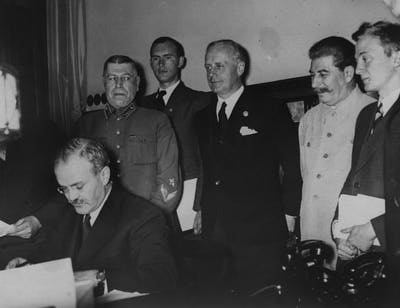
The Supreme Soviet ratifies the German-Soviet Nonaggression Pact: A huge banquet is held in Ribbentrop's honor at the Kremlin in Moscow. Ribbentrop, Stalin, Molotov, Voroshilov, Kaganovich, Mikoyan and Beria are all seated at the head table. Stalin toasts Hitler's health. Ribbentrop will later drive some of his peers to distraction when he repeatedly relates how he was treated as 'an old party comrade' by the communists. The party ends at 3:00 AM, and most of the participants are sleeping it off as the momentous events their 'diplomacy' change the world forever.
Canned Goods: SS Sturmbannfuehrer Alfred Helmut Naujocks receives the code words "Grandmamma dead," thus ending a 14 day wait at the German radio station at Gleiwitz, where he and Gestapo head Heinrich Mueller are to carry out a mock attack. The "canned goods:" a dozen "condemned criminals" dressed in Polish military uniforms and given fatal injections before being shot. Note: See Alfred Naujocks, sworn affidavit, Nuremberg, November 20, 1945, the only documentary evidence for this item. Shortly after signing his affidavit, Naujocks mysteriously disappeared from custody.
At 8 PM, the German radio station at Gleiwitz near the Polish border announces it is under attack. All serious contemporary historians believe Hitler staged this attack as an excuse to invade Poland. (See August 10, 15, 17)
By nightfall on Thursday, a million and a half German soldiers were moving into final position for the invasion of Poland. Operation Himmler was put into effect at 8 PM as SS men dressed in Polish Army uniforms staged a series of fake border attacks, including the one at Gleiwitz where they seized the radio microphone and shouted out in Polish, "People of Poland, the time has come for war between Poland and Germany!" Hitler now had his propaganda excuse for launching the war.
1941 World War II: Iran:British and Soviet troops link up at Kazvin.
1942 World War II: Various:
Radio Broadcast: Short public service announcement by Hitler. Full Text: 420730.
Medical experiments: From a letter from General Field Marshal Milch addressed to the Reichsfuehrer SS:
Dear Mr. Himmler: I thank you very much for your letter of the 25th of August. I have read with great interest the reports of Dr. Rascher and Dr. Romberg. I am informed about the current experiments. I shall ask the two gentlemen to give a lecture, combined with the showing of motion pictures, to my men in the near future. Hoping that it will be possible for me to see you at the occasion of my next visit to headquarters, I remain with best regards and Heil Hitler! Yours, E. Milch
Auschwitz: SS Dr. Johann Paul Kremer arrives at Auschwitz to replace a doctor who had fallen sick: (See September 1-5)
He carried out assessments of prisoners attempting to gain admission to the hospital. Kremer ordered most of them killed by phenol injection. He selected prisoners who struck him as particularly good experimental material, and questioned them just before their deaths, as they lay on the autopsy table awaiting injection, about such personal details as their weight before arrest and any medicines they had used recently.
Eduard Schulte—in return for additional loans—irrevocably transfers ownership of Giesche's Silesian-American shares to Erzag, a Swiss firm controlled by his Swiss financial backers (La Roche). Schulte became an officer of the Swiss new corporation and even obtained German permission to export zinc, an essential war commodity, to Switzerland allegedly to finance the Swiss purchase of the American shares and bonds (Harriman) of Silesian-American. The revenue from the zinc sales stayed in Swiss banks. Almost a year after Germany declared war on the US, the US Justice Department took over the Giesche shares of Silesian-American Corporation as enemy-owned property. (Silence)
1943 World War II: Various:
Heavy RAF raid on Berlin (over 600 bombers):
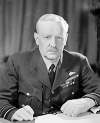
'Bomber' Harris: Judged by the standards of our attacks on Hamburg, the Battle of Berlin did not appear to be an overwhelming success. With many times as many sorties, a far greater bomb load, and ten times as many casualties, we appeared to have succeeded in destroying about a third of the acreage destroyed in the attack on Hamburg; the actual figure, as far as it could then be estimated from air photographs, was 2180 acres over and above the 500 or so acres destroyed before the main Battle of Berlin began. But by comparison with the results of all earlier attacks on Berlin it was a devastating blow, and the industrial damage, as often happened in rather scattered attacks, was particularly heavy; among the factories damaged were many of the largest and most important plants for the production of war material in Germany, and government offices of all kinds were very heavily damaged, so that a number of government departments had to be evacuated. Moreover, it seems that we underestimated the effects of our bombing at the time. When complete photographic cover of Berlin was obtained at the end of the war, it was found that 6340 acres of the main built-up areas had been destroyed.
Massacre: Poles of Wola Ostrowiecka are rounded up by Ukrainian Nationalists. The men are hacked to death while women and children are packed into a school into which grenades are thrown: 550 people are murdered including 220 children.
1944 World War II: Various:
The British cross the Gothic Line:
On this day in 1944, the British 8th Army breaks through the Germans' "Gothic Line," a defensive line drawn across northern Italy.
The Allies had pushed the German occupying troops on the Italian peninsula farther and farther north. On June 4, U.S. Gen. Mark Clark had captured Rome. Now the Germans had dug in north of Florence. Built earlier in the year, this defensive line consisted of fortified towns, stretching from Pisa in the west to Pesaro in the east. One of these towns was Siena, home to much glorious medieval art--also home to the Italian partisans, guerillas who had been harassing the Germans and remnants of Italian fascists since Italy had surrendered. Their ability to create chaos and confusion behind the Germans' own lines was of great aid to the Allies.
Expert strategic maneuvering by British General Harold Alexander, who opened his offensive on August 25, surprised the Germans, and the 8th Army swept through the Plain of Lombardy, crashing through the Gothic Line. (History.com)

Churchill to Field Marshal Smuts: "My object now is to keep what we have got in Italy . . . . With this, I hope to . . . . break into the Po Valley, and ultimately advance by Trieste and the Ljubljana Gap to Vienna. Even if the war came to an end at an early date I have told Alexander to be ready for a dash with armored cars.
FDR to Churchill:

I was very glad to receive your account of the way in which General Wilson had concentrated his forces in Italy and has now renewed the offensive. My Chiefs of Staff feel that a vigorous attack, using all the forces available, should force the enemy into the Po Valley. The enemy may then choose to withdraw entirely from Northern Italy. Since such action on his part may enable the enemy to release divisions for other fronts, we must do our best to destroy his forces while we have them in our grasp. I am sure General Wilson has this as his objective. With an offensive under way and being pressed full strength in Italy, I am sure that General Eisenhower will be satisfied that everything possible is being done in the Mediterranean to assist him by mauling German divisions which might otherwise be moved against his forces in the near future...It is my thought that we should press the German Army in Italy vigorously with every faculty we have available, and suspend decisions of the future use of General Wilson's armies until the results of his campaign are better known and we have better information as to what the Germans may do
Churchill to FDR:
All operations in Italy are conceived and executed by General Alexander . . . he is now in contact for twenty miles on the Adriatic flank with the Gothic Line . . . . I have impressed most strongly upon General Alexander the importance of pressing with his utmost strength to destroy the enemies armed forces as well as turn his line. It will not be easy for the Germans to effect a general retreat . . . . Only the direct route to Germany is open. We shall do our utmost to engage, harry, and destroy the enemy. The decisive battle has yet however to be fought . . . . As to the future, continuous employment against the enemy will have to be found . . . . This employment can only take the form of a movement first to Istria and Trieste and ultimately upon Vienna. Should the war come to an end in a few months, as may well be possible, none of these questions will arise.
Russian troops enter Bucharest and soon occupy all of Romania: Utilizing the reasoning that since no armistice has been signed and Romania is still enemy territory, the Russians behave accordingly; raping, plundering, looting and murdering the civilian population.
The United States delegation protested that the Soviet Union was improperly implementing the Yalta declarations in Romania and called for elections to choose a new government. The Soviet Union, however, refused even to discuss the question, labeling it interference in Romania's internal affairs.
Holocaust: Natzweiler concentration camp in Alsace is liberated: At least 25,000 prisoners, Jews and non-Jews had died there of starvation, ill-treatment, murder or execution. (Atlas)
The camp was accorded Category III status, and like Mauthausen, which destroyed Spanish Communists in its quarry under conditions of staggering overwork and cruelty, Natzweiler was used to destroy Russians under similar conditions at its quarry site, while two dozen other European nationalities suffered famine, untreated disease, physical and mental abuse, and medical experimentation in the central camp and its 70 exterior slave labor sites.
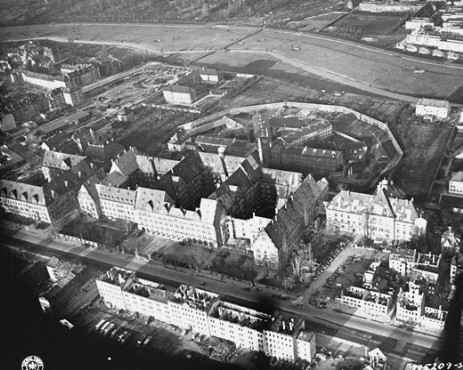
1946 Nuremberg Tribunal: After the Defendants make their final statements, the Tribunal retires to consider Final Judgements. (See: 30 September 1946)
The Prosecution, in the final speeches, has treated the defendants and their testimony as completely worthless. The statements made under oath by the defendants were accepted as absolutely true when they could serve to support the Indictment, but conversely the statements were characterized as perjury when they refuted the Indictment. That is very elementary, but it is not a convincing basis for demonstration of proof. The Prosecution uses the fact that I was the second man of the State as proof that I must have known everything that happened. But it does not present any documentary or other convincing proof in cases where I have denied under oath that I knew about certain things, much less desired them. Therefore, it is only an allegation and a conjecture when the Prosecution says, "Who should have known that if not Goering, who was the successor of the Fuehrer?" Repeatedly we have heard here how the worst crimes were veiled with the most secrecy. I wish to state expressly that I condemn these terrible mass murders to the utmost, and cannot understand them in the least.
[For the full text of today's proceedings, Click here.]1951 Cold War: William O. Douglas calls for recognition of PRC:
Following a hiking and mountain climbing trip through Asia, Supreme Court Justice William O. Douglas issues a statement calling for the recognition of the communist People's Republic of China. His comments touched off an angry partisan debate in the U.S. Senate . . . .
The firestorm set off by Douglas's comments showed that despite talk about a "bipartisan" Cold War foreign policy, party loyalties were a very important component of post-World War II debates on America's diplomacy. In 1951, Republicans were still blaming Democrat Harry S. Truman for having "lost" China to the communists in 1949. The Democrats had their turn, however, during the presidential campaign of 1960, when John F. Kennedy jabbed at the Republican administration of President Dwight D. Eisenhower for "losing" Cuba. [For further details, Click here.]
1980 Polish government signs accord with Gdansk shipyard workers: On this day in 1980, representatives of the communist government of Poland agree to the demands of striking shipyard workers in the city of Gdansk. Former electrician Lech Walesa led the striking workers, who went on to form Solidarity, the first independent labor union to develop in a Soviet bloc nation. [For further information, click here.]
1982 Poland: Anti-government demonstrations Click here]
1994 Russia officially ends its military presence in the former East Germany and the Baltics after half a century. (AP)
2005 Death: Joseph Rotblat: Jewish Polish born and naturalized British physicist. He received the Nobel Peace Prize in 1995 in conjunction with the Pugwash Conferences on Science and World Affairs, an organization of scientists of which he was secretary general from its founding until 1973, for their efforts towards nuclear disarmament. In the summer of 1939, shortly before Germany invaded Poland to begin World War II, he returned to Poland to bring his wife to England, but she was ill and could not travel. He returned alone and never saw her again. He never remarried. Early in 1944 Rotblat went with Chadwick's group to work on the Manhattan Project to build the first atomic bombs. He always had strong reservations about the use of science to develop such a devastating weapon. He was shocked in March 1944, at a private dinner with Leslie Groves during which it was made clear that the atomic bomb was no longer being developed to deter Nazi Germany, but to subdue the Soviets. By the end of 1944 it was also apparent that Nazi Germany had abandoned the development of its own bomb and Rotblat resigned in December. He was the only physicist to leave the Manhattan Project on the grounds of conscience, though others later refused to work on atomic bombs after the defeat of Japan.
Edited by Levi Bookin (Copy editor)
levi.bookin@gmail.com




Click to join 3rdReichStudies



Disclaimer: This site includes diverse and controversial materials--such as excerpts from the writings of racists and anti-Semites--so that its readers can learn the nature and extent of hate and anti-Semitic discourse. It is our sincere belief that only the informed citizen can prevail over the ignorance of Racialist "thought." Far from approving these writings, this site condemns racism in all of its forms and manifestations.
Fair Use Notice: This site may contain copyrighted material the use of which has not always been specifically authorized by the copyright owner. We are making such material available in our efforts to advance understanding of historical, political, human rights, economic, democracy, scientific, environmental, and social justice issues, etc. We believe this constitutes a "fair use" of any such copyrighted material as provided for in section 107 of the US Copyright Law. In accordance with Title 17 U.S.C. Section 107, the material on this site is distributed without profit to those who have expressed a prior interest in receiving the included information for research and educational purposes. If you wish to use copyrighted material from this site for purposes of your own that go beyond 'fair use', you must obtain permission from the copyright owner.
Please Note: The list-owner and moderators of 3rdReichStudies are not responsible for, and do not necessarily approve of, the random ads placed on our pages by our web server. They are, unfortunately, the price one pays for a 'free' website.